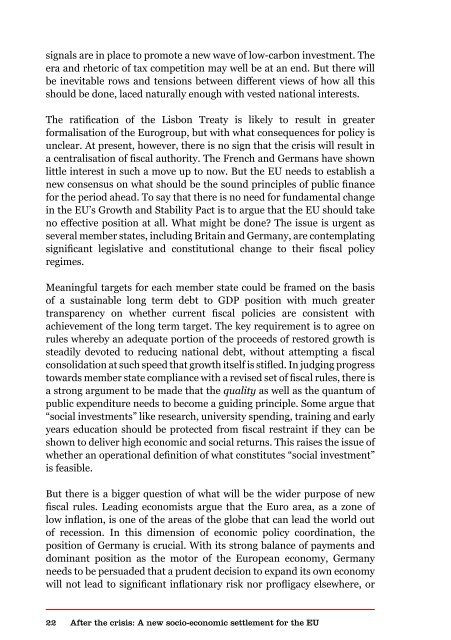Authors Iain Begg | Gabriel Glöckler | Anke Hassel ... - The Europaeum
Authors Iain Begg | Gabriel Glöckler | Anke Hassel ... - The Europaeum
Authors Iain Begg | Gabriel Glöckler | Anke Hassel ... - The Europaeum
You also want an ePaper? Increase the reach of your titles
YUMPU automatically turns print PDFs into web optimized ePapers that Google loves.
signals are in place to promote a new wave of low-carbon investment. <strong>The</strong><br />
era and rhetoric of tax competition may well be at an end. But there will<br />
be inevitable rows and tensions between different views of how all this<br />
should be done, laced naturally enough with vested national interests.<br />
<strong>The</strong> ratification of the Lisbon Treaty is likely to result in greater<br />
formalisation of the Eurogroup, but with what consequences for policy is<br />
unclear. At present, however, there is no sign that the crisis will result in<br />
a centralisation of fiscal authority. <strong>The</strong> French and Germans have shown<br />
little interest in such a move up to now. But the EU needs to establish a<br />
new consensus on what should be the sound principles of public finance<br />
for the period ahead. To say that there is no need for fundamental change<br />
in the EU’s Growth and Stability Pact is to argue that the EU should take<br />
no effective position at all. What might be done? <strong>The</strong> issue is urgent as<br />
several member states, including Britain and Germany, are contemplating<br />
significant legislative and constitutional change to their fiscal policy<br />
regimes.<br />
Meaningful targets for each member state could be framed on the basis<br />
of a sustainable long term debt to GDP position with much greater<br />
transparency on whether current fiscal policies are consistent with<br />
achievement of the long term target. <strong>The</strong> key requirement is to agree on<br />
rules whereby an adequate portion of the proceeds of restored growth is<br />
steadily devoted to reducing national debt, without attempting a fiscal<br />
consolidation at such speed that growth itself is stifled. In judging progress<br />
towards member state compliance with a revised set of fiscal rules, there is<br />
a strong argument to be made that the quality as well as the quantum of<br />
public expenditure needs to become a guiding principle. Some argue that<br />
“social investments” like research, university spending, training and early<br />
years education should be protected from fiscal restraint if they can be<br />
shown to deliver high economic and social returns. This raises the issue of<br />
whether an operational definition of what constitutes “social investment”<br />
is feasible.<br />
But there is a bigger question of what will be the wider purpose of new<br />
fiscal rules. Leading economists argue that the Euro area, as a zone of<br />
low inflation, is one of the areas of the globe that can lead the world out<br />
of recession. In this dimension of economic policy coordination, the<br />
position of Germany is crucial. With its strong balance of payments and<br />
dominant position as the motor of the European economy, Germany<br />
needs to be persuaded that a prudent decision to expand its own economy<br />
will not lead to significant inflationary risk nor profligacy elsewhere, or<br />
22<br />
After the crisis: A new socio-economic settlement for the EU

















